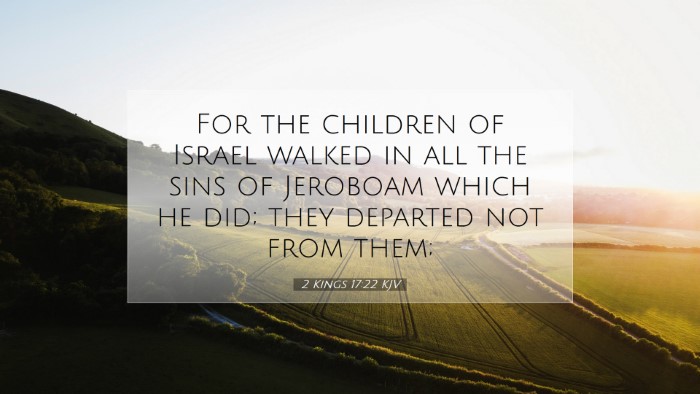Commentary on 2 Kings 17:22
2 Kings 17:22 states: "For the children of Israel walked in all the sins of Jeroboam which he did; they departed not from them."
This verse encapsulates a critical moment in the history of Israel, reflecting both the actions of the people and the consequences of their choices. Below is a synthesis of insights from various public domain commentaries, aimed at providing a thorough understanding for pastors, students, theologians, and Bible scholars.
Historical Context
To fully appreciate this verse, one must consider the historical background surrounding the kingdom of Israel during this period. After Solomon's reign, the kingdom experienced a division, leading to the establishment of two separate nations: Israel in the north and Judah in the south. Jeroboam, the first king of Israel, set in motion a series of idolatrous practices that would profoundly affect the spiritual trajectory of the nation.
The Sins of Jeroboam
Definition and Implications
Jeroboam's reign is often characterized by his idolatry, specifically the establishment of golden calves in Bethel and Dan. Matthew Henry notes that "the calves were made to keep the people from going to Jerusalem to worship at the temple, fearing that their loyalty might shift to Judah."
This strategic religious move was not merely about worship. It was an effort by Jeroboam to solidify his power and prevent the people from returning to the Davidic line of kings and, by extension, to the rightful worship of Yahweh. As a result, the sins initiated by Jeroboam became entrenched practices among the Israelites.
Perpetuation of Sin
Albert Barnes elaborates on the impact of these sins: "The children of Israel walked in all the sins of Jeroboam which he did; they departed not from them." This phrase signals the continuation and normalization of sin within the community. The reference to 'walking in sin' indicates an active, deliberate lifestyle rather than occasional moral failures.
This ongoing rebellion against Yahweh revealed a fundamental spiritual decline. The people's choices not only reflect a disobedience to God but also signal a departure from their covenant relationship. As Adam Clarke points out, they "continued in their idolatry until it became second nature to them."
Theological Significance
From a theological perspective, 2 Kings 17:22 serves as a stark reminder of the consequences of leadership failure and the corporate nature of sin. The actions of Jeroboam had repercussions that extended beyond his reign; they shaped the spiritual landscape of Israel for generations.
Corporate Responsibility
This idea of corporate identity is crucial. The community, influenced by its leaders, collectively embraced idolatry. Matthew Henry notes, "The influence of kings and magistrates upon their people is very great; and the neglect of religion among those in authority is a great mischief."
Reflection and Application
The implications of this verse are profound for contemporary readers. Leadership carries a significant weight in shaping moral and spiritual values. The admonition to avoid the sins of Jeroboam serves as a cautionary tale for both spiritual leaders and laypeople alike.
-
Examine Leadership Influence:
It prompts leaders today to consider how their actions and decisions can deeply affect the faith community. The need for godly character and adherence to biblical truth is paramount.
-
Personal Accountability:
Moreover, it fosters a spirit of personal accountability among believers. Each individual must assess whether they are complicit in practices that detract from their devotion to God.
-
Warnings Against Syncretism:
This verse also provides a warning against the blending of secular practices with spiritual beliefs, a practice that can dilute the integrity of one’s faith.
Conclusion
In summary, 2 Kings 17:22 serves as a critical reflection on the nature of sin, leadership, and community. By understanding the consequences of Jeroboam's idolatry and recognizing the persistent nature of rebellion against God, contemporary believers are called to a deeper commitment to holiness and faithfulness. This commentary synthesizes insights into the lived realities of faith and the importance of adherence to God's commands, primarily highlighting the necessity for both personal and collective fidelity to God's covenant.


